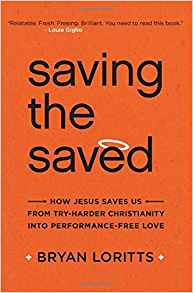Saving the Saved: How Jesus Saves Us From Try-Harder Christianity Into Performance-Free Love
Bryan Loritts
–Review by Landrum P. Leavell III, ThD.
This book is a great follow-up to the previously reviewed White Awake: An Honest Look At What It Means to Be White by Daniel Hill. Loritts has also written a fantastic (punch-you-in-the-face) parable, titled Right Color, Wrong Culture: The Type of Leader Your Congregation Needs to Become Multiethnic.
Loritts is lead pastor of Abundant Life Christian Fellowship in Mountain View, CA. He was a cofounder of Fellowship Memphis and is president of Kainos Movement, an organization aimed at establishing the multiethnic church in America as the new normal. He is also the son of a well-known pastor, something with which I resonate.
The Gospel of Matthew is the backdrop of the book. “This ancient message is a lifeline to us today too in a world based on measuring performance. Just as Matthew wrote to the Jews in his gospel, we were never meant to flounder under the pressures and anxieties of show Christianity. Make no mistake: we are called to live in obedience, but Jesus Christ wants to save us from the illusion that our actions can ever make God love us more or less.” (back cover)
One of my gauges for a good book is its “tweetability.” This book was profoundly tweetable. In fact, one of my friends and parishioners responded to me on FB: “…after about the 4th tweet, I ordered the book… You’re killing me…” Whether discussing mercy, goodness, pride, the transformation of repentance, abiding, the resurrection, forgiveness and reconciliation, generosity, worry, or marriage, Loritts has studied and mined both Scripture and a wide range of contemporary and historic sources.
Yet for me, the strength of the book (for a white dude in the evangelical eco-system) is the transparency of a black man who has grown up, lives in, serves in, and continues to grow and minister in the real world. The book forces majority culture folks to break out of an insulated existence to expose, empathize, and experience the challenges of real-world faith. Personal examples from the growing up years give a picture of faithful parents who modeled Christlikeness when faced with a barrage of racial epithets following a not-your-fault car wreck, asking a son to pray for the ability to forgive and for an opportunity to share Christ with the man.
He speaks with clarity on important issues: “Reconciliation has to do with the restoration of the relationship; forgiveness is the letting go of the offense, a refusal to be mastered by the wrong.” (139)
“Grace is not spiritual amnesia… Grace is a rearview mirror… It keeps me humble and propels me forward.” (119)
“There really is no such thing as man-made goodness. Good, Jesus preaches, is actually bad: morality is immoral if its source is not God.” (78)
“Never judge a book by its cover—or a person by his performance. A lot of people appear to do good things, but there’s plenty of distance between who they are in the spotlight and who they are offstage.” (79)
“Solomon is called the wisest person who ever lived, but this same man acted in a completely foolish manner with women. It’s complicated… We’re all complicated messes in need of daily grace.” (116)
Another gem is his treatment of “charcoal grace.” Mentioned only two times in Scripture, both times by John in reference to Peter. You’ll have to read it. A charcoal fire was to Peter’s sin what your olfactory memory from childhood in your grandmother’s kitchen is to you. (118-9)
Loritts writes with honesty and angst about the “marriage apocalypse” impacting our society in general and the black community in particular, where the brokenness is significantly higher, for understandable and yet inexcusable reasons. “Slavery thrived off of the division of families… This ugly chapter in American history bequeathed to my people a legacy of broken families—a legacy whose seismic tremors we continue to feel today.” (177) Quoting Dr. Richard Banks from his book, Is Marriage for White People?: “Over the past half century, African Americans have become the most unmarried people in our nation. By far. We are the least likely to marry and the most likely to divorce; we maintain fewer committed and enduring relationships than any other group. Not since slavery have black men and women been as unpartnered as we are now.”
For a multiplicity of reasons, this book needs to read—to inform, expose, inspire, convict, and propel you to grace and trust instead of self-reliance and performance.
You’re welcome.

